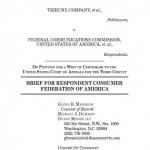
More from the silly lawsuit department.
A federal court is being asked to grant constitutional rights to five killer whales that perform at marine parks — an unprecedented and quixotic legal action that is nonetheless “likely to stoke an ongoing, intense debate at America’s law schools over expansion of animal rights,” according to the Associated Press.
People for the Ethical Treatment of Animals (PETA) is accusing the SeaWorld marine parks of keeping five star-performer whales in conditions that violate the 13th Amendment’a ban on “slavery” and “involuntary servitude.” PETA relishes engaging in the court of public opinion, as evidenced by its provocative anti-fur and pro-vegan campaigns. Real courts are different, though.
Harvard Law School constitutional scholar Larry Tribe, while a supporter of animal rights, notes that “some Americans might find it bizarre or insulting to equate treatment of animals to the sufferings of human slavery.” SeaWorld Accused of Enslaving Killer Whales. Duh!
The original complaint, filed last October, alleged that
Section One of the Thirteenth Amendment prohibits the conditions of slavery and involuntary servitude without regard to the identity of the victim and without reference to “persons.” Although enacted in the historical context of African slavery, the Supreme Court has repeatedly declared that the Thirteenth Amendment is not so limited. Because the Amendment forbids any form of slavery, it embodies a principle that can be (and over the years has been) defined and expanded by common law to address morally unjust conditions of bondage and forced service existing anywhere in the United States.
“Slavery is slavery, and it does not depend on the species of the slave any more than it depends on gender, race or religion,” says general counsel to PETA, Jeffrey Kerr. Yet this overlooks the obvious issue that animals of all sorts, whether domesticated (like cattle and sheep), pets (dogs and cats) or zoological (lions, tigers and bears, oh my!) have since the founding of the United States been treated legally as property, i.e., “chattels.” And if unborn children in the womb have no independent legal existence — with which no one can argue, regardless of the legality of abortion — and minor children can be forced to work for their parents at home without pay, how in the world could the U.S. Constitution treat zoo specimens the same as black folks? Humans are different; that’s why we have laws, politics and a Constitution in the first place.
One does not have to be a PETA-basher to recognize that the “humane” treatment of animals is not at all the same as treating animals as humans.
P.S. SeaWorld filed a motion to dismiss on December 19, which is due to be heard by the federal court in San Diego on Feb, 12, 2012.




